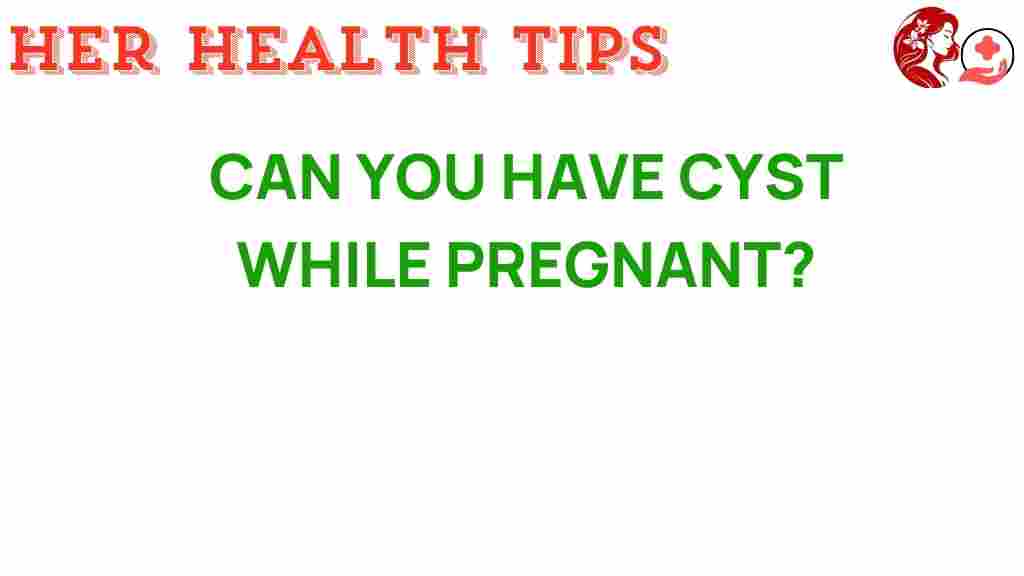Surprising Insights: Can You Have a Cyst While Pregnant?
Pregnancy is a time of incredible change and excitement, but it can also bring about various health concerns. One question that often arises among expectant mothers is whether it is possible to have a cyst during pregnancy. In this article, we will delve into the connection between cysts and pregnancy, exploring their potential impact on health, symptoms, treatment options, and how they are monitored through ultrasound. Understanding these aspects is crucial for maintaining optimal reproductive health during this significant period.
Understanding Cysts
A cyst is a closed sac-like structure that can be filled with fluid, pus, or other material. Cysts can form in various parts of the body, including the ovaries, which are particularly relevant during pregnancy. The types of cysts that may occur include:
- Functional cysts: These are the most common type and usually develop during the menstrual cycle. They typically resolve on their own.
- Dermoid cysts: These are non-cancerous and can contain hair, skin, or teeth.
- Endometriomas: These are associated with endometriosis and can cause pain and complications.
During pregnancy, hormonal changes can lead to the development of functional cysts, primarily in the ovaries. While most of these cysts are harmless, understanding their implications is essential for managing a healthy pregnancy.
Can You Have a Cyst While Pregnant?
Yes, it is possible to have a cyst while pregnant. In fact, studies suggest that ovarian cysts can be quite common during pregnancy due to hormonal fluctuations. Most of these cysts are functional and typically do not cause problems. However, there are important considerations regarding their monitoring and potential complications.
Symptoms of Cysts During Pregnancy
Many women with ovarian cysts might not experience any symptoms at all. However, some may notice signs that warrant further investigation. Common symptoms include:
- Pain in the lower abdomen: Especially if it is sharp or persistent.
- Bloating: A feeling of fullness or swelling in the abdomen.
- Changes in menstrual cycle: Although menstruation ceases during pregnancy, some women may experience irregularities.
- Pressure symptoms: Such as difficulty emptying the bladder or changes in bowel habits.
If you experience any of these symptoms, especially severe pain, it’s important to consult with your healthcare provider.
Diagnosis and Monitoring
During prenatal care, your doctor will likely perform routine ultrasounds. An ultrasound is a safe and effective way to monitor your pregnancy and can help identify the presence of cysts. Here’s how the process typically works:
- Initial Evaluation: If a cyst is suspected, your doctor may order an ultrasound to assess its size and characteristics.
- Follow-up Scans: Depending on the findings, follow-up ultrasounds may be scheduled to monitor the cyst over time.
- Assessment of Symptoms: Your healthcare provider will evaluate any symptoms you may have in conjunction with ultrasound findings.
Potential Complications
While most cysts are benign and resolve on their own, there are some potential complications to be aware of:
- Cyst Rupture: This can happen, particularly if the cyst is large. A ruptured cyst may cause severe pain and bleeding, requiring immediate medical attention.
- Torsion: In some cases, a cyst can cause the ovary to twist, leading to reduced blood flow and severe pain.
- Endometriosis Complications: If you have endometriomas, they can lead to further complications during pregnancy.
It’s essential to discuss any concerns with your healthcare provider to ensure appropriate monitoring and management throughout your pregnancy.
Treatment Options
The treatment of cysts during pregnancy largely depends on their type, size, and any symptoms present. Here’s a breakdown of common approaches:
- Observation: Most functional cysts do not require treatment and are monitored over time.
- Pain Management: Non-prescription pain relief methods, such as acetaminophen, may be recommended for discomfort.
- Surgery: In rare cases where a cyst causes severe symptoms or complications, surgical intervention may be necessary, typically performed after the first trimester to minimize risks.
Always consult with your healthcare provider before taking any medication or undergoing treatment.
Importance of Prenatal Care
Maintaining regular prenatal care is crucial for monitoring both your health and the health of your baby. This includes:
- Regular Check-Ups: Scheduled visits with your healthcare provider to monitor your pregnancy progress.
- Ultrasound Assessments: As mentioned, ultrasounds help in identifying and monitoring cysts.
- Open Communication: Discuss any symptoms or concerns with your provider to ensure appropriate care.
Troubleshooting Tips for Expecting Mothers
If you suspect you have a cyst or experience any symptoms, follow these troubleshooting tips:
- Keep a Symptom Diary: Note any symptoms you experience, their frequency, and intensity, and share this with your healthcare provider.
- Stay Hydrated: Drinking plenty of water can help with bloating and discomfort.
- Rest and Relaxation: Stress can exacerbate pain, so practice relaxation techniques such as deep breathing or prenatal yoga.
- Follow Medical Advice: Adhere to your doctor’s recommendations regarding monitoring and treatment.
By staying informed and proactive about your health, you can navigate any challenges that arise during your pregnancy.
Conclusion
In conclusion, having a cyst during pregnancy is possible and often not a cause for concern. With proper monitoring through ultrasound and regular prenatal care, most women can manage their health effectively. Understanding the symptoms, potential complications, and treatment options is vital for ensuring a healthy pregnancy. If you have any specific concerns or questions, do not hesitate to reach out to your healthcare provider for personalized advice and guidance.
For more information on reproductive health during pregnancy, visit this resource. Remember, your health is paramount, and staying informed is the best way to navigate your pregnancy journey.
This article is in the category Reproductive and created by HerHealthTips Team
